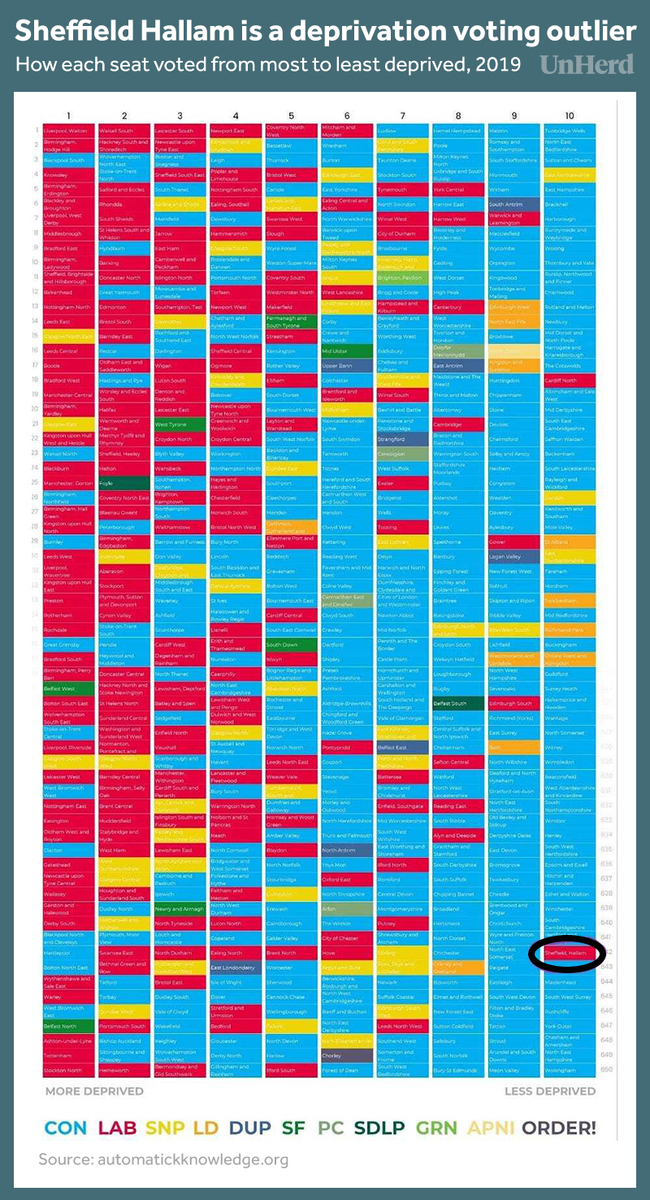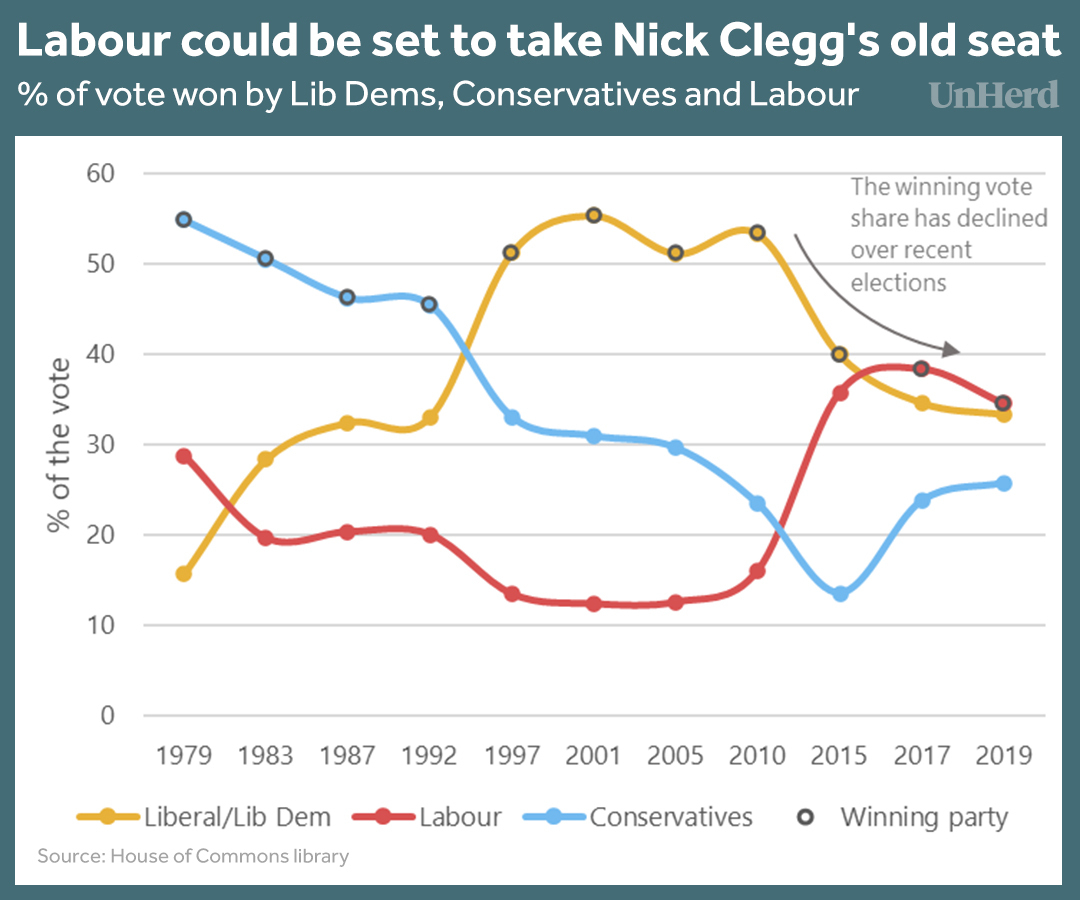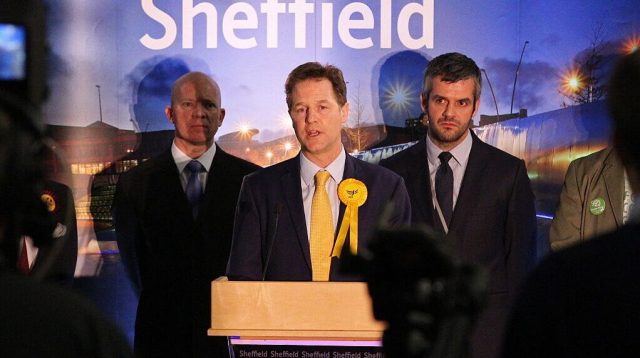Nick Clegg lost his seat in the great 2015 Lib Dem wipeout. (Getty)

If you live in Sheffield Hallam constituency, there’s a fair chance you’ve been approached for a vox pop by a broadsheet newspaper recently. The Financial Times, The Guardian, The Times — all have come to visit in the last month or two, eager to hear what voters have to say. If you’re looking for an unusual constituency to spice up your coverage, Hallam will always catch your eye. It’s just quite… weird.
To understand Sheffield Hallam, you first need to forget everything you thought you knew about Sheffield. Unlike the city’s industrial east, Hallam’s neighbourhoods are invariably described as “leafy”, and its houses – stacking up the hills in sometimes alarming angles – climb up into the Peak District.
Its politics are similarly at odds with the rest of Sheffield. While Margaret Thatcher was reviled across the rest of South Yorkshire, the constituency gave her its strong backing. Then, as the country at large swung towards New Labour in 1997, Hallam’s Labour vote actually dropped. Previous Tory and Labour voters both threw themselves behind a new loyalty — the Lib Dems, who kept a tight grip on the area, with more than 50% of the vote, for several elections; first with Richard Allan, and then Nick Clegg.
But at the end of the coalition years, Labour support soared, with (the now metro mayor of South Yorkshire) Oliver Coppard contesting the seat in 2015. He didn’t quite manage it, but two years later Nick Clegg was ejected anyway. In the most recent election, Labour’s majority was wafer-thin: just 712 votes, or 1.2% of the vote. It’s now the only Labour/Lib Dem marginal in the country.
Here’s another statistic that tells you just how unusual Sheffield Hallam is: Labour’s current candidate and until recently local MP Olivia Blake won in 2019 with just 34.6% of the vote. That was the lowest vote share for a winner anywhere in Britain, as the Conservatives still took a big chunk of the votes. In fact, looking at the numbers, Hallam should still be a Tory seat.
Sheffield-based geographer Alasdair Rae has produced a fascinating chart from the 2019 election (see below), showing how constituencies voted by their level of deprivation. At the top left is the UK’s most deprived constituency, Liverpool Walton. And at the bottom right is the UK’s least deprived constituency, Wokingham. There’s a clear blue/red pattern, as more deprived constituencies generally voted Labour (though Johnson’s Tories made some big inroads), while less deprived constituencies generally voted Conservative, or occasionally Lib Dem.

Hallam (circled), however, bucks the national trend. It’s the ninth least deprived constituency in the country — its children are well-educated, its people are relatively healthy, its crime rates are low. And despite all that, it elected a Labour MP.
Blake’s theory is that Hallam is not immune to the problems faced by the country, rather the constituency embodies them. “It’s definitely been trending Left,” she tells me, which she thinks is related to an influx of groups like young families: “The demographics have shifted quite considerably in our favour.” She also argues that Hallam’s apparent affluence can be misleading. “On paper, you might look at Hallam and think ‘it’s the wealthiest seat in South Yorkshire, they’ll be isolated from the cost-of-living crisis,’ but that’s certainly not what I’ve been picking up.”
Data on constituencies can be a bit patchy, but it’s not clear that age is a big factor in this Left shift. It’s true that the number of people in their 20s has gone up. But among people in their 30s, it’s pretty flat, while there are now far more 70-somethings. Perhaps there’s some truth, though, in the notion that the younger middle classes now tend to be more Left-leaning than in previous generations, and maybe the broader Left-wing bent of the city has seeped into this wealthier outpost. Brexit is also likely to be a factor — Hallam voted strongly for Remain.
But national trends can only tell us so much, particularly when a race is as neck-and-neck as it is in Hallam. So much for the parties then, what of the personalities of the two people in with a chance?
I’ve spent time with both, and there’s quite a clear difference in style between Blake and Shaffaq Mohammed, the Lib Dem contender. Where Blake is bubbly, Mohammed is more sedate. Mohammed lives in industrial Tinsley, has a family background in steel, and speaks with an accent that blends his Kashmiri heritage and a Sheffield inflection. Blake’s middle-class background, meanwhile, hews closer to most Hallam constituents; her Yorkshire accent is nearer to what some describe as “Northern RP” — clean consonants, flat vowels. Mohammed is only ever seen wearing a suit and tie, Blake is a bit more dressed down. The snap election has been awkwardly timed for them both: Mohammed is in the midst of renovations on his house, while one of Blake’s dogs needs to have an eye operation.
When I join them, the gathering of Labour activists for Blake’s round of canvassing includes a few local councillors and a student who has been out every day since his exams finished Despite being elevated to the House of Lords a few years ago, Baroness Blake of Leeds clearly still relishes street politics.
There’s an odd mix of houses along the canvassing route near Endcliffe Park — palatial Victorian villas, more modest bungalows, and low-rise blocks of flats. The voters are similarly eclectic. One describes himself as “apolitical” and refuses to buzz Blake into his block of flats so she can post her leaflets. Another is delighted when he clocks who Blake is: “The animal lover!” he cries. “Yes!” agrees Blake. He goes on to talk to her in quite some detail about recent happenings among the local badger populations — before confirming he will indeed vote Labour.
At another home, a crisp voice over the intercom is apologetic, but firm. “Ok, I’m going to stop you right there,” she instructs Blake. She would vote for Labour, were it not for one issue: their policy of levying VAT on private school fees. “Under no circumstances whatsoever will I ever vote Labour unless that policy changes,” she tells Blake, explaining that she works for a private school that may have to close. “I would not send any child of mine to the state schools in the area,” she avers. As we walk away, Blake says that she believes claims of school closures are a bit “overblown”, and that this isn’t the aim of the policy.
Blake herself is on the Left of the Labour Party, having served in Jeremy Corbyn’s shadow cabinet and being less in tune with the current Starmer leadership. I ask her how concerned she’s been about the way figures on the Left, such as Diane Abbott, have been treated. “Everyone was a bit concerned about Diane, but I’m pleased we got to the right decision about that,” she says.
The following week, Shaffaq Mohammed suggests a meeting outside at Endcliffe Park café, meaning right next to the funfair. It feels very on brand for the Lib Dems, whose national campaign has been themed around Ed Davey doing various silly stunts. Mohammed discloses that he was invited along to Thorpe Park with Davey, but “me and rides don’t get on”.
Mohammed — or “Shaff” as his team call him — is also the leader of the Lib Dem group on the council. On the doorstep, he explains that voters’ biggest issues are the NHS and the environment, in that order. He draws particular attention to dentistry, explaining that he, like many, has been waiting for an appointment at the Charles Clifford Dental Hospital to have a tooth fixed.
On the environment, he talks at length about sewage dumping, describing the number of spills in Hallam as unacceptable. He’s tried to create a wedge with Labour on this — one of Mohammed’s recent leaflets claimed that “our Labour MP voted with the government to let [Yorkshire Water] off the hook”. The vote he’s referring to is an amendment to bring Ofwat, the water regulator, under the Growth Duty — which requires regulators to have regard for promoting economic growth. Mohammed claims this could allow water companies to escape fines for polluting rivers. Blake doesn’t comment on the specifics of that piece of legislation, but her spokesperson told me: “This is a feeble attempt by the Lib Dems to claim credit for the hard work through which campaigners and the Labour frontbench raised the issue to the top of the political agenda.”
Despite losing his seat more than five years ago, Nick Clegg still looms large over Hallam. As revealed by the Financial Times, Clegg has donated to the local Liberal Democrats — though how much exactly is unclear. Mohammed tells me that they’re occasionally in touch. He admits that the student fees issue — which did so much to put some voters off Clegg — still comes up on the doorstep. Whether that’s fair or not is one thing (Mohammed points out none of the parties are now proposing to cut tuition fees), but it might still linger with some of those late 20-somethings who have moved to Hallam.
So who will win come 4 July? On one reading, Labour should have it sewn up. In 2019, “Peak Corbyn” was well and truly over, while Sheffield Hallam’s Labour MP in the previous parliament, Jared O’Mara, was booted out of the party for making misogynistic and homophobic comments, and was later convicted of fraud. If the Lib Dems couldn’t take the seat even then, surely an ascendant Labour Party will do so comfortably? Most bookies are currently backing Labour to hold it — offering only 1/5 on this outcome, vs 3/1 on the Lib Dems.

But things aren’t quite so straightforward. Not least because 2024 may well see a collapse in Conservative support as their campaign continues to falter. The party only chose its Hallam candidate a few weeks ago — Isaac Howarth, currently a student at Sheffield University — and there’s no sign of Tory leaflets in the constituency. It’s fair to say they’re not looking to put up a big fight here.
If the Tory vote crumbles, things become unpredictable. Should those supporters break for the Lib Dems, as in 1997, then they could yet snatch Hallam back. And Mohammed points out that if you tot up the votes from this year’s local elections across all of Sheffield Hallam’s five wards, the Lib Dems come out comfortably on top — with 13,133 votes to Labour’s 9,814.
But the momentum Labour has at the national level will be hard to overcome. Blake describes herself as “pretty confident” about winning. “[In 2019] we had to go back three or four times, just to our voters… this time we’re trying to persuade other people to vote for us.” For those of us staying up to report on the election, a long night is likely. The smart money is on a recount — but as ever in Hallam, I wouldn’t bet on it.
***
A version of this piece appeared in The Sheffield Tribune.










Join the discussion
Join like minded readers that support our journalism by becoming a paid subscriber
To join the discussion in the comments, become a paid subscriber.
Join like minded readers that support our journalism, read unlimited articles and enjoy other subscriber-only benefits.
Subscribe